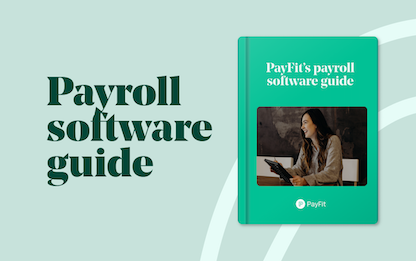- Blog
- |People management
- >Employee wellbeing
- >Happiness in the workplace
Don’t worry, be happy! How happiness in the workplace can boost your profits


The workplace is changing. Increasingly, we’re moving away from the traditional working environment and moving towards a more flexible way of working.
Gone are the days when you could get away with introducing an employee bonus scheme to keep them happy and content. Instead, employees are now seeking more than just financial rewards; they want benefits and they want to see that the business they work for cares about the environment and the wellbeing of its workforce.
Did you know?
Up to 80% of workers would rather keep a job with benefits than take one that offered more pay and no benefits?
🤒 A healthy workplace = a healthy business. Is your business healthy?
Turnover and profits are not the only markers of a healthy business. Employees who are happy at work tend to enjoy life more and have better health, stronger relationships and a greater sense of purpose.
Caring about your employees' happiness will have a positive impact on your business as happier staff members are generally more productive, creative and committed to the role.
Did you know?
In the UK, more than half of employees say they are unhappy and 36% are seriously considering leaving their jobs. According to the OECD, it’s estimated that work-related anxiety costs the UK economy as much as £26 billion each year.
💪 Flex your flexibility muscles
Offering flexible working conditions is a good place to start when looking to address workplace happiness. Flexible working is a growing trend and is particularly beneficial for startups and small businesses.
Not only is it a way of working that fits in with each employee's unique needs, but it is also more conducive to a modern way of living.
By offering flexible start and finish times, and/or giving your employees the option of working from home, you are showing trust and understanding towards your workforce.
Did you know?
A recent survey by Wildgoose found that 70% of respondents who were given the option of flexible working hours founded it provided them with a good work-life balance. Furthermore, 68% of parents who are able to work flexibly feel it’s important in helping them to juggle work and family life.
Keynote speaker and broadcaster Simon Cohen, who represented the Dalai Lama and decided that the secret to his happiness was to give away his £1 million media business, states that:
"The key driver for happiness and wellbeing within the workplace is systemisation. Whether it is dedicated silent spaces; daily, humanising team reflections; meetings in circles that always start with mindfulness moments; time in nature; personal measures of happiness translated into performance metrics at work….It is essential that companies create and curate systems to integrate the ingredients for happiness and wellbeing into the heart of their operations."
Simon Cohen
😍 Make recruits swipe right
It's all about that first impression. Much like a dating app, everyone wants to try and stand out from the crowd (in a good way at least). Business is no different, and providing your new recruits with a good first impression significantly increases the chances of a positive and long-term collaboration.
Fun and engaging pre-employment activities don't have to be expensive to make you stand out. It can be in the form of a postcard, a personalised welcome email, or a quick video from the hiring manager or CEO.
Pre-employment engagement activities are a great way to start on the right foot with your new recruit. As with most things in life, people want to feel wanted, valued and special.
🐣 Onboarding cheat sheet
Onboarding begins before a new starter's first day. Sending a welcome postcard before they start is a nice touch.
Set up the new employee’s desk with branded merchandise or an office survival kit.
The first day should feel like a birthday or a celebration.
Assign new starters a mentor or a buddy to guide them through the first weeks.
Create a 30-day happiness checklist.
Offer free lunches or lunch credits for a week.
Present the goals of the business and showcase any current or future projects you and your team are working on.
Set goals for their first 30 days. Sit down with them and work through this together.
🛋 Let employees sleep on the job
Yes, you read that correctly. Letting your employees de-stress at work can be invaluable.
Employees spend most of their waking hours at work, so a relaxed environment is critical to creating a workplace that is stress and drama-free.
Engaged employees need to feel that the working environment and culture is something that they want to be a part of. This can be achieved by creating areas where people can recharge and relax.
Mental health can be a big productivity drain, and it is essential to create areas where employees can safely disconnect. This can be achieved by adding a sofa area, a games room, a break-out area or a nap pod. Let employees unwind and chill and your business will thrive.
At PayFit, we’ve found that team members are more productive in a relaxed environment. We encourage them to work away from their desks and make use of our flexible workspaces. We have comfy couches and the obligatory table tennis table which is often used during breaks. It’s also another way for staff to interact with each other.
👔 Sort your managers out
We’ve all, at some time or another, worked for a terrible boss. Hollywood even turned this subject into a movie! Although a fairly lamentable film, Horrible Bosses did manage to gross £170m at the box office!
Poor management is one of the biggest driving factors in losing talent. A 2018 study by Lexington Law found that 50% of employees left a position to escape a bad manager.
It’s vital that business owners, HR managers and directors focus on management training and creating strategies to increase employee retention and workplace happiness. A good place to start is to provide your management team with both management and leadership training.
🕵️♀️ Go undercover
Every member of your team will have their frustrations from time to time. Failure to listen and remedy concerns can result in a loss of productivity and create the type of work environment where people dread Monday mornings.
Listening to your employees' needs and providing open communication will help you build a happier and more stable team. You can do this by gathering instant, but anonymised, intelligence via surveys through platforms like Culture Amp.
Giving employees a voice and encouraging them to give regular feedback on how to make their working lives better is only likely to benefit the company.
Once you have considered the survey results, create a small focus group including directors, managers and members of the team. The purpose of these focus groups should be to allow staff of varying levels to have a say in how to improve happiness in the workplace.
The insights gathered will help you gauge how people are feeling and allow you to build relevant action plans. This will help you to motivate employees and have people pulling in the same direction in no time at all.
Why not go one step further?
You may wish to consider manger surveys.
Google, for example, asks staff 13 questions about their line managers. Employees use a five-point scale from “strongly agree” to “strongly disagree” to help measure the performance of their leaders.
They believe that there are eight common behaviours of highly effective managers. The survey addresses topics such as micromanagement and communication skills.
🎯 Set personal roadmaps for your team
Happiness in the workplace can be undermined if people feel like they’re stagnating. What’s the point of regularly putting in a good shift if there is no room for advancement or recognition?
Career and personal development are a vital part of employee engagement. If your business is small and you can’t offer promotions or increased salaries due to budgetary restraints, then look at other avenues to help your employees grow and develop.
You can do this through courses and identifying personal development goals for each employee. Maybe an employee wants to have more confidence in public speaking, or they want to improve a specific skill. Whatever it is, help each employee achieve their goals and you’ll reap the rewards.
Remember, if an employee’s desire to “climb the ladder” is not met or they feel unstimulated, then don't be surprised if they start looking elsewhere.
You can create an environment that's pro personal growth and development by holding regular meetings to discuss targets. By building a personalised “roadmap” towards success, you can help stimulate performance and encourage personal development.
🔝 Switch things up
Not many of us get excited about doing the same daily tasks. So, switching things up whenever possible can help reduce productivity drain.
This can be achieved by assigning new responsibilities to teams or departments.
Perhaps you could ask the finance team, for example, to create a social calendar for team events? Or maybe you could get the ops team to create a team quiz?
By getting teams to work together on a fun project, you can encourage conversation and collaboration among individual team members. You never know, it may also lead to people receiving a confidence boost or developing new skills!
You could also look to switch things up by adding a new task to an employee's daily or weekly routine. This is beneficial to the individual and the organisation as it will make people feel valued and help boost engagement and productivity.
Some leaders may feel that if their team members are busy trying new things then it might decrease efficiency or distract them from their primary tasks. However, this is unlikely to be the case. People like to learn and try new things and by providing the opportunity to do so you may even be able to unearth some hidden talents among your existing workforce.
🔗 Get social
Very Happy People is a study that was conducted by Diener and Seligman in 2002. The study looked at the common trends surrounding the happiest and most successful people.
The study showed one unique benefit: the happiest and most successful people have the strongest and most diverse social relationships and support structures.
There are several reports that back up these findings. Social support networks are the single greatest predictor of happiness and long-term success. As a result, your business should encourage social activities to help staff form friendships and networks both in and outside of the workplace.
Your most social and well-connected staff are likely to be your most valuable employees.
👀 Our vision of a happy workplace
We’re confident that by implementing some of these tips you will increase morale, help achieve higher staff retention rates, and improve productivity.
Remember, happy employees are productive employees and we believe that without the desire to achieve happiness within the workplace, you can’t maximise an employee’s true potential.
🙌 The WOW factor
At PayFit, from the moment a potential recruit receives their offer letter, our goal is to create that WOW factor.
We do this by surprising new starters with a fun welcome pack, a breakfast and of course a robust onboarding experience.
We believe that first impressions have a lasting impact and lay the foundations for success at PayFit.
"I was pleasantly surprised with the onboarding process. Starting from the welcome package that I received at home containing a handwritten card signed by all my future colleagues, to the welcome breakfast and lunch on the first day. My buddy helped me to settle in and I couldn’t be happier."
Madalina, PayFit UK's Customer Care Manager - joined in July 2019
Don't forget...
Happiness is contagious. If you lead your team in a confident, positive and approachable manner, you’ll create a domino effect trickling from the top, down.
PayFit is a payroll provider that helps companies to simplify and automate their payroll and HR processes. Interested in finding out how PayFit can help you? Book a demo with one of our product specialists today!


UK Expenses Management - A Guide For Employers

Overtime Pay Rates & Laws in the UK

The 2024 UK National Living Wage - An Employer’s Guide

The Cost Of Recruitment In The UK - What You Might Not Know

UK National Insurance Changes for January 2024

